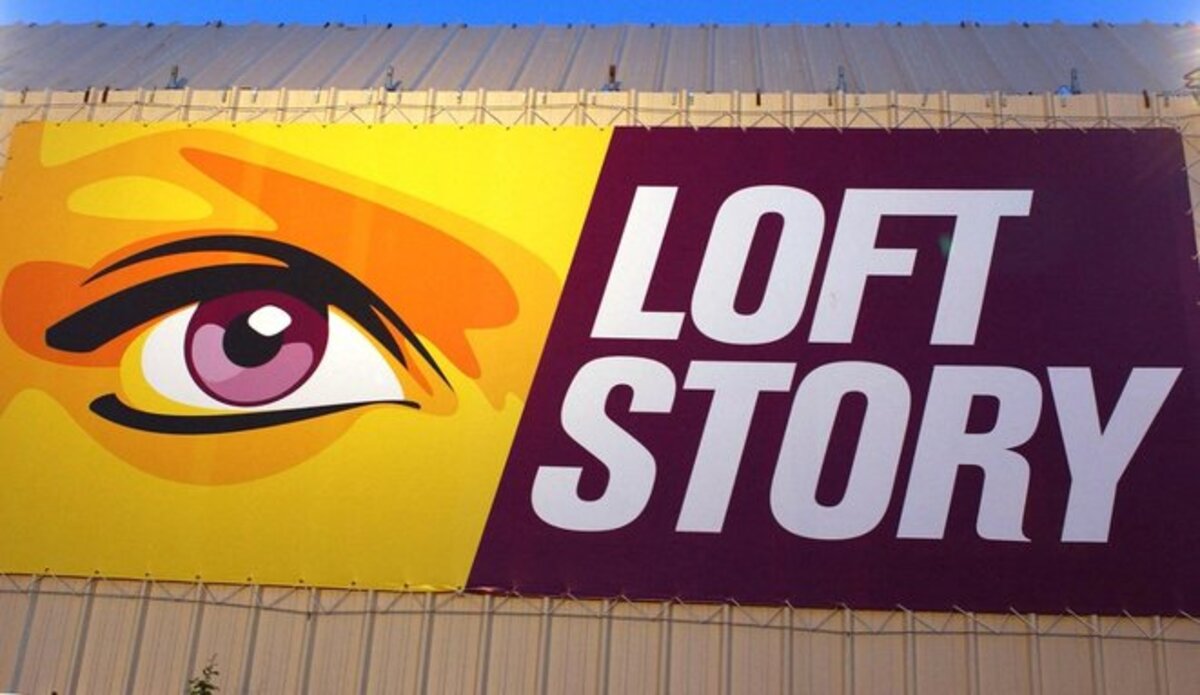On April 26th 2001 a new television show broadcast on the M6 channel sparked a media frenzy and the kind of endless debates the French adore and which quickly descend into generalities.
The programme in question was 'Loft Story' a French version of the 'Big Brother' franchise and the first reality television programme shown in France. At the time everyone was talking about this new genre of programme in which eleven unknown single people – six young men and five young women - had to live behind closed doors but on camera in a studio 'home'. As the show progressed candidates were gradually ejected by the public until just one – heterosexual - couple remained 70 days later.
The contestants' escapades were the subject of lively conversations; and two of those taking part, Loana – the eventual female winner - and Steevy, proved particular ratings hits. The newspapers benefited from the public's fascination with the new TV format too. “In the course of the show each front page devoted to 'Loft' put up sales by an average of 10%,” the newspaper Libération said at the time.

Enlargement : Illustration 1

There were many people who criticised the programme, seeing it as a vulgar affair, a symbol of France's decline. The president of Arte France television channel at the time, Jérôme Clément, even told Le Monde newspaper that the programme marked the arrival of “creeping fascism”.
Rather more numerous, however, were people who enjoyed the sight of these eleven young single people who had become guinea pigs in this new reality-style television that did away with the old “faceless” formats of the past. It lasted 70 days and was an historic event in the story of French television. Those who were old enough to have watched it still recall it.
Everyone had their own view about the show and it cut across all backgrounds and generations, and was discussed in school playgrounds and on university campuses. “Not only were the programme and its broadcast the object of discussions, they were passionate discussions,” recalls sociologist Gabriel Segré, a university lecturer and researcher at Paris Nanterre university. He studied the programme at the time, just after doing a thesis on Elvis Presley “his fans and the business of beatification of the singer who died in '77 and who was famous across the whole world”.
Libération had fun with these so-called “intellofts” who pontificated about the programme. “What can you do, the rest of the news seems piddling,” explained writer and critic Philippe Sollers at the time, a few months before the attacks on the Twin Towers in New York. So France was bored and watched 'Loft Story'.
“'Loft' has become a universal concept, a condensed version of a human amusement park, of a ghetto, of being behind closed doors and of the 'The Exterminating Angel' [editor's note, a Luis Buñuel film about guests unable to leave a dinner party],” said the late cultural theorist and philosopher Jean Baudrillard at the time.
“Nothing escaped Baudrillard's conjectures, not even a programme such as 'Loft Story',” stated an article in the review Hermès when the philosopher died in 2007. “Faced with the question of why people watched a reality show of this type, he came up with the theory of 'radical democracy',” the article continued. “In a normal democracy the value of a famous person lay in their merit. 'Loft story' introduced 'radical democracy': everyone can be famous having no merit at all other than that of allowing themselves to be viewed. A triumph of complete mediocrity in an era of throwaway celebrities and dishes. The apogee of the 'Society of the Spectacle' described by another cursed figure Guy Debord [editor's note, a philosopher].” George Orwell and Marshall McLuhan were also brought into the debate.
Faced with this scandal France's television regulator, the Conseil Supérieur de l’Audiovisuel (CSA), issued a recommendation aimed at “editors and distributors of audiovisual communications services” in May 2001 about this new type of programme, which were defined as “programmes of confinement”. The key elements of such programmes was that the participants were confined, eliminated progressively through the show and subject to virtually continuous filming.
“Whatever the objective of these programmes and despite the consent expressed by their participants, it is imperative, with regard to respecting human dignity, that these participants have times and places where they are not subject to public observation,” said the CSA. “The Conseil thus asks that these programmes consist of daily periods of respite significant and reasonable duration that give rise to no sound or visual recording nor any broadcasting. The participants must be clearly informed of this. Safety reasons can nonetheless justify the permanent monitoring of the participants' lives by those in charge of the production.”
The CSA continued to keep a close watch on reality TV over the years. In 2011 it published a “reflection on reality television programmes” based on a series of interviews with industry professionals and experts. One academic, Guillaume Soulez, a professor at Paris 3 Sorbonne university, explained that reality TV was born out of a combination of deeper cultural changes: pop art, psychological culture and the emergence of the system of “stars”.
The document identified a core definition of such shows – as before, they involved participants who were kept confined on the set and progressively eliminated from the programme – but underlined that there was a “much broader nexus of programmes that are inspired directly or indirectly by them”. The CSA noted: “Over and above the issue of the genre, 'reality television' has changed the grammar of the way that images are looked at and has thus extended its influence into all other television genres, including the news.”

Enlargement : Illustration 3

Ten years later and the CSA have once again returned to the subject in a report called “Reality television at 20: change and influence”, published in January 2021. It points out how reality TV has become a commonplace on television. “The fact that it matches the tastes of a young audience and its moderate production costs, in relation to other genres such as fiction, has made it a major part of the schedule on some channels,” says the CSA's latest report.
Has the public tired of such shows? Over recent years the programmes in which the participants are kept confined on a set have given way to shows where the contestants take part in a “collective life” in fantastic surroundings without being subject to the same sort of restrictions as in 'Loft Story' or 'Big Brother'. These programmes can be found across all French television stations, from 'Star Academy' and 'Koh-Lanta' on TF1, to 'The Island' and 'The Bridge' on M6 and 'Les Anges de la téléréalité' ('The Angels of Reality TV') on NRJ 12. There are also participants in cookery shows such as ' Top Chef ', 'Qui sera le prochain grand pâtissier?' and 'Repas de fête'.
The narrative style of reality TV – like interviews to camera – has now fed through into other programmes. Reality television is everywhere. The semiotician François Jost compares it to yoghurt, in being a product that has changed considerably over the years. “No one thinks it refers to reality any more. It's a game more than anything,” he told Belgian broadcaster RTBF in 2018.
“In 20 years reality TV and its participants have become a not-insignificant part of the media landscape, and even more so given that, as the recent CSA report suggests, we now see reality TV as a 'narrative style' whose codes are used in other programmes,” writes Nathalie Nadaud-Albertini, a sociologist at the National Audiovisual Institute (INA) in that organisation's media review.
In the end, sociologist Gabriel Segré takes the view that far from being the “television revolution” that this programme is often held up as, 'Loft Story' follows on in a “direct line of televisual descent” from other television programmes. He said: “Rather than the arrival of a new televisual era, the programme resembles a reworking of several existing formulas, the use of tried and tested areas, the application and development of elements, the germs of which were already present in or being implemented in previous programmes: a fascination with the everyday and the ordinary. The natural, the spontaneous, the authentic that take on the role of supreme values (reality shows); a taste for how people relate to each other, the exposure of private life, confessions (from anonymous people in the TV of the '90s); the removal of the boundaries between those on the screen and the viewers opposite them; the transformation of people's fortunes through TV (which takes care of people, helps, deals with distress, finds the guilty parties ..); the remaking and adaptation of American formats ('The Wheel of Fortune', 'The Price is Right').”
Twenty years after it first began in France reality TV no longer causes a scandal. It has joined the era of confrontation. As Nathalie Nadaud-Albertini notes in the INA media review “controversy has become a rule of reality TV”. And more than anything reality TV has entered the world of business and of influencers who are paid by prestigious brands to promote their products. “Today we're seeing participants who earn enormous amounts of money and for whom it's become a profession in its own right,” said semiotician Virginie Spies, who is director of the Culture and Communication laboratory at the University of Avignon in southern France.
Many of these reality TV stars are based in Dubai, the city in the United Arab Emirates which, lacking huge oil reserves, became the main commercial, financial and leisure centre in the region (it is worth reading urban theorist Mike Davis's 'Fear and Money in Dubai' for more about the city).
The French YouTuber Marie S’Infiltre recently used a hidden camera to delve into this world of Dubai influencers, who are happy to escape French tax inspectors and pressure from the public. They are also indifferent to political issues such as the exploitation of workers in the UAE (Mediapart has done an interview on this issue with sociologist Amélie Le Renard author of 'Le Privilège occidental. Travail, intimité et hiérarchies postcoloniales à Dubaï', published by Les Presses de Sciences Po). On the YouTube video reality TV star Jazz Correia states: “I don't pay taxes and personally I couldn't care less. I've no scruples about not paying taxes to people who, in the end, are the same people who come and rob us and crap on us.”
In the best-known reality TV shows in France such as 'Les Anges' or 'Les Marseillais' the participants can gain bankable fame via social networks, earning up to 250,000 euros a month in some cases. Often they are represented by the agency Shauna Events. This was set up by businesswoman Magali Berdah, who has become a commentator on the 'Touche pas à mon poste' ('Hands off my TV set') TV media show hosted by Cyril Hanouna on the C8 channel in France.

Enlargement : Illustration 4

This former insurance salesperson has made a fortune by getting companies to place products with the 'influencers' that she represents, of whom the best-known is Nabilla Benattia. “I love the fact that people no longer know if I'm the worst type of clown or the businesswoman who created a new economic model with unbelievable numbers. That's what excites me,” she told Vanity Fair magazine who profiled her.
Before her, Stephane Courbit, who produced 'Loft Story' and who had once worked as a trainee for Christophe Dechavanne, a star presenter on TF1 television in the 1990s, had also become very wealthy (see Laurent Mauduit's article from 2010 here). Courbit, who has become one of the wealthiest people in France (74th according to the business magazine Challenges), invested in Shauna Events. Courbit's story also inspired novelist Aurélien Bellanger's latest novel which was published as part of the prestigious Blanche list at publishers Gallimard. The title is simply 'Téléréalité'.
Ultimately, if reality TV still comes under attack it is because of repeated accusations of sexism (read the interview, in French, that Faïza Zerouala did with Paul Sanfourche, author of 'Sexisme story. Loana Petrucciani' about the first female winner of 'Loft Story'). That was the original sin; and Loana was the first sacrificial victim.
--------------------------------------------------------------------------
- The original French version of this article can be found here.
English version by Michael Streeter


